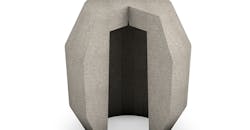High-Efficiency Riser Technology for Casting Steel
Q: Is it possible to use the high-efficiency riser systems commonly used with iron castings instead for steel castings?
A: Yes, high-efficiency riser systems commonly used for iron can be employed with steel castings, creating many advantages for the operator and the foundry. However, there are a few important details to bear in mind about this application.
First, to review the relevant details of the application, recall that a riser (sometimes referred to as a feeder) is a reservoir built into a metalcasting mold to prevent cavities from forming during solidification as a result of shrinkage. Most metals are less dense in liquid form than solid, so a casting may shrink as the metal cools, which may result in a void at the final point of solidification.
The optimal riser system depends on the current molding system in use by the foundry. If the foundry employs a high-pressure, horizontally parted green-sand system, ASK Chemicals’ EXACTCAST OPTIMA riser would provide the best solution.
If the foundry employs a no-bake molding system, ASK Chemical’s EXACTCAST KMV riser would provide the best solution. With these solutions in place, the operators would recognize the following improvements over traditional fiber riser systems:1) Improved yield due to mini-riser feeding efficiency;
2) Reduced riser contact areas, reducing finishing and grinding costs; and,
3) No fiber material contamination in the molding system.
Additionally, ASK Chemicals’ OPTIMA riser creates a perfect, residue-free mold with improved compaction and a clean, clearly defined breaker edge directly on the casting.
Steel casting temperatures can be significantly higher when compared to iron castings. This high-temperature profile demands higher refractoriness from the exothermic feed mixture. ASK Chemical’s EXACTCAST product line has developed special, high-refractory formulations to meet these requirements.
Another factor to be recognized is that steel castings typically have significant volume requirements. ASK’s KMV and OPTIMA risers are effective in addressing this need. These products reduce riser volumes by 50% or more, allowing current melt production to be used in other casting applications.
An important criterion in the foundry’s selection of a riser are the process costs associated with removing risers from the cooled casting. A traditional riser system requires lancing or cutting tools. The KMV risers’ reduced contact areas and Optima’s cleanly defined breaker edges allow risers on steel castings to be knocked off easily with a hammer. This adds value to the casting while reducing metal loss for foundry operations.
Additionally, due to the solidification morphology of steel alloys, riser necks may require larger contact areas. ASK Chemical’s KMV and Optima risers can be used with full contacts or varying breaker strategies where larger contacts become necessary.
At ASK Chemicals we aim to provide solutions to assist our customers to achieve greater profitability. Let’s pour more castings and less risers!
Join the Conversation. Email Your Questions for ASK Chemicals Share your insights, opinions, and elaborate on the questions and the experts' answer(s). You must be logged in to the website in order to post your comments.